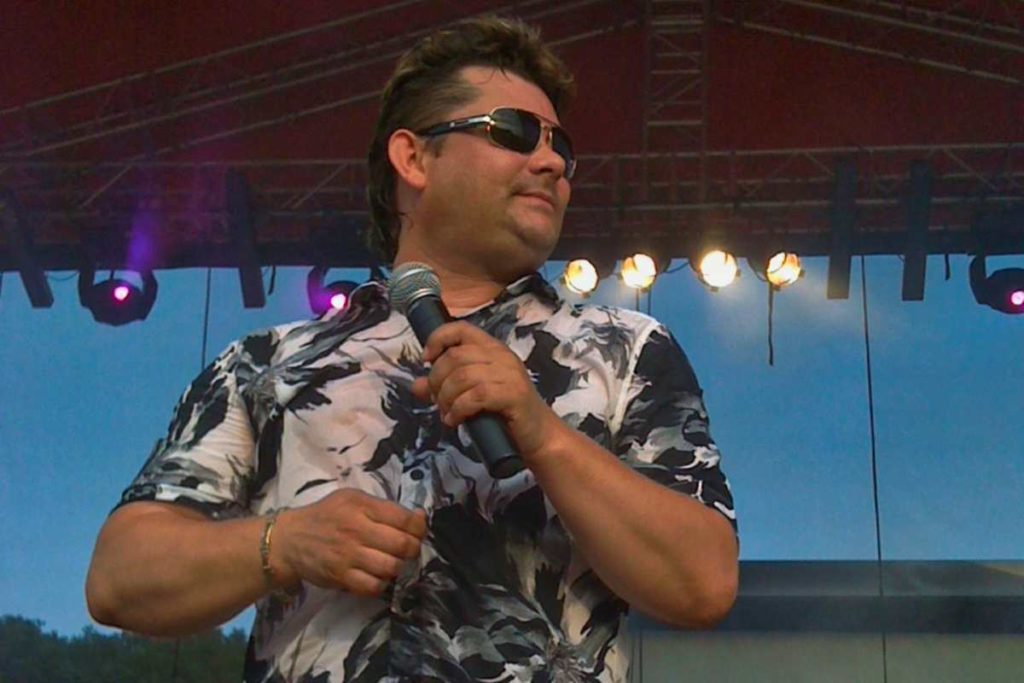Never heard of Disco Polo music? Then you’re probably not from Poland. Because there, this style of music has developed into a mass phenomenon in recent decades, which many people view quite critically. But what exactly is Disco Polo music and how can it be that some songs reach click numbers on Youtube that are much higher than the population of Poland? Today we try to explain the phenomenon and show you what the Mafia has to do with it, why many Poles say they don’t know Disco Polo, but still know the lyrics by heart at weddings and why Disco Polo music has what it takes to hit the international scene.
This is Disco Polo Music
According to Wikipedia, Disco Polo is the Polish version of Euro Disco and moves somewhere between Eurodance, Rap and Modern Talking. It’s hard to describe the style of Disco Polo exactly, you just have to listen to several songs. In any case, Disco Polo is fast and danceable. The lyrics are mostly relatively shallow and the melodies are backed with rich bass. Sounds a little trashy and it is for many, but above all Disco Polo music puts you in a good mood. The name is derived from the style Italo Disco, which had many fans in Europe for a short time in the 80s and then also spilled over to Poland.
The historical development
However, Disco Polo has its roots not only in Italian disco music, but also in old Slavic folk songs. These were mostly played at weddings by bands that worked with synthesizers, giving it a modern touch in the 80s. But there were also influences from the Soviet Union, many Russian-language songs were performed by the bands in Polish. Many later stars of the scene were also recruited from the wedding bands.
The first band to play disco polo was the group Bayer Full, which later had great success in China. In 1984 they began to develop their own style, which was further developed by the group Top One from 1986 (English band names were and are very popular).
Disco Polo in the 90s – Mafia playground
In the 90s, music became more and more popular and cassettes were sold not only in music stores, but often also on markets. In 1995 alone, 80 million cassettes were officially sold; it is impossible to say exactly how many millions more were traded on the black market. The major music labels viewed Disco Polo skeptically and wanted nothing to do with the often cheaply produced music. However, the first major music labels such as Blue Star and Green Star emerged during the turnaround period and the music became more and more popular.
Disco Polo music seemed fresh, modern and Western and accompanied Poland’s awakening into a new, democratic age. The Mafia recognized Disco Polo as an opportunity and invested massively in smaller labels. The share of Disco Polo cassettes in which the Mafia (especially the notorious Mafia from Pruszków near Warsaw) had its fingers in the pie may have been around 75%.
The introduction of private television and the emergence of the shows Disco Polo Live and Disco Relax ensured the further spread of Disco Polo. Millions watched the shows on the private channel Polsat, and by the mid-1990s at the latest, the whole country was gripped by disco polo fever. It even went so far that during the 1995 presidential elections, several candidates had Disco Polo stars record their own campaign anthems. This was also the case with Aleksander (“Oleg”) Kwaśniewski, who won the election. You can see the result in this video:
By the end of the 90s, however, the phenomenon seemed to be over. Sales figures plummeted and it was no longer considered chic among young people to listen to disco polo music. At the same time, Polish rap and hip hop were experiencing a boom, and Western pop music was also becoming more popular. Some groups like Toples, Boys or Weekend were still able to achieve notable success, but overall the time of Disco Polo as a phenomenon seemed to be over, similar to that of Eurodance in Western Europe. That this was related to the decline of the biggest mafia clans in Poland, which occurred at the same time, is considered by many to be no coincidence.
The comeback
It remained relatively quiet for a long time and the old guard now mostly performed only sporadically at weddings or gave smaller concerts, often in firehouses or village halls. Why there was a disco polo renaissance around the year 2006/2007 can no longer be said with certainty. The increasing popularity of Internet radio channels, the new platform YouTube and the now defunct Wrzuta.pl ensured that more people were now listening to disco polo again. Many did so perhaps out of nostalgia, because in the turbulent 1990s the simple, harmonious music may also have been an escape from everyday life.
But it could also be because the music had changed fundamentally in the meantime. If it often seemed cheap and poorly produced in the 1990s, there were no longer any technical differences to Western productions from the mid-1990s onward.
A new, young generation of performers entered the scene and today Disco Polo music is more popular than ever. You can notice this just by zapping through the Polish TV channels, there are five nationwide channels broadcasting Disco Polo 24 hours a day and several regional channels. A few years ago, this led to a minor scandal. That’s because when the licenses for digital stations were awarded, there were initially only about 15 broadcasting slots available, three of which went to disco polo stations. The Catholic station TV Trwam, on the other hand, went away empty-handed …
Disco Polo “galas” or festivals now take place all over the country and often attract tens of thousands of fans. How it will continue in the future remains to be seen, but the popularity of Disco Polo is unbroken.
Topics in the songs
The range of topics in the songs is not particularly broad. Of course, with a phenomenon as big as Disco Polo, there are always outliers, but most of the songs are about love, sex, or cars (there are actually songs that sing about a natural gas-powered Audi, a tuned Passat, or a black VW Golf).
Hidden messages and gaga lyrics
Poland is a strongly Catholic country, which is especially true for the parts of the country where Disco Polo is particularly popular. Perhaps also in order not to incur the wrath of the church fathers, overly obvious sexual content is avoided or only expressed in a veiled way. When former Toples (the name is already a clear indication) frontman Marcin Sigieńczuk sings about the rubber bursting, he probably doesn’t mean the car tire he sings about …
But it goes even crazier. Some songs are so bizarre that you don’t quite know how serious the performer actually is. “She Likes Oranges” is the title of this song about a woman who leaves her groom at the altar. Why the song is called that, I still don’t understand.
Remixes
The fact that Disco Polo is so popular again is perhaps also due to the numerous remixes that now exist. Artists like DJ Sequence, Dance 2 Disco, Candynoize or Fair Play make sure that old songs are remixed, but they also create remixes on behalf of the artists, which appeal to a different target group and often sound completely different from the original. Many of them are now trying their hand at their own songs, which are often even in English.
Is Disco Polo sexist?
Traditional role images are still much more prevalent in Poland than in Western Europe, especially in rural areas. And the number of male disco polo groups and singers is also significantly higher than that of female representatives. Although there are well-known female performers such as Etna, Shazza (who is often referred to as the “Madonna of disco polo”), Camasutra or Top Girls, most combos are male. Mixed-gender groups with notable successes are rather rare, a weighty exception being “Piękny i Młodzi” (“The Beautiful and the Young”).
The lyrics of the mostly male performers are often about spurned love, how to pick up a woman, or they sing about special physical advantages of the female sex. In the West, songs with often lewd lyrics that reduce women to their sexuality are really only known from the rap scene, but in mass culture they are actually unthinkable. In Poland, things are different, and the voices of those who consider disco polo music sexist usually go unheard.
Poland’s Northeast – The Mecca of the Movement
The traditional role model in disco polo songs is ultimately also a reflection of society. And disco polo is a phenomenon that is by no means equally represented throughout the country. It is the rural regions in the east of the country where the music is particularly popular. The voivodeships of Lublin, Pre-Carpathia and Warmia-Masuria and the north of Mazovia are considered strongholds. However, Podlaskie on the border with Belarus is considered the “Mecca” of disco polo. The capital Białystok has already produced countless representatives and is considered the cradle of Disco Polo Music.

In the big cities in the West, on the other hand, disco polo is rather frowned upon and associated with the rural population and lack of education. Disco polo clubs in Krakow, Poznan, Gdansk or Wroclaw usually do not last very long.
Embarrassing vs. Everyone knows the lyrics
The attributions “rural”, “primitive” and “stupid” are also the reason why many people – especially in cities – do not (want to) have anything to do with Disco Polo. Here you hear Western or Polish music with supposedly higher standards. At weddings, on the other hand, disco polo is not only tolerated nationwide, but suddenly even the most disco polo-critical city dweller can sing along effortlessly to the biggest hits – even though he would never normally listen to such music, of course. It’s a phenomenon that many disco polo performers make fun of and that has already been sung about in numerous songs.
Millions of clicks for one song
And even if many people don’t want to publicly admit their love for Disco Polo music – the numbers promise otherwise. YouTube, with its click numbers, is a good measure of how popular a song is. The song “Ona tańczy dla mnie” (“She dances for me”) by Weekend, for example, has already been viewed 130 million times and is now also sung by groups of fans in soccer stadiums, while “Przez twe oczy zielone” (“Because of your green eyes”) by Akcent has even achieved 191 million clicks.

Boys or Akcent?
Which brings us to the next topic, the question of the greatest disco polo star of all time. The frontman of Akcent (behind the band names often hide a lead singer and a combo of dancers, who are often exchanged) is called Zenon Martyniuk. He is considered the most successful artist of all time and has a strongly nasal voice. Only one other comes close to his status, and that is Marcin Miller. Miller, frontman of the group Boys, has had countless hits and, like Zenon Maryniuk, has been in the business since the early 90s. Who is the greatest in the business often causes heated discussions between the fan camps and I don’t presume to judge here.
Disco Star – The trashiest talent show in the world
Disco Polo and television – it’s been a love affair for years. There are two shows on the Polo TV channel, the leading station, that are worth a closer look. One of them is Disco Star. Here, more or less talented young artists perform, and especially in the first seasons everything seemed incredibly cheaply made. The jury was chaired for a long time by Marcin Miller, who thus enjoys more or less the status of Dieter Bohlen in Germany or a Simon Cowell in the English speaking world. The teenager Disco Misiak (“Disco Bear”) caused laughs all over the country, just like the group “Pragnienie miłości”. In any case, as in the first episodes of a season of American Idol, there is always something to laugh about …
“Love in Disco Rhythm” – The Disco Polo Soap
The same station also runs a soap that is permanently set to disco-polo music. The scripted reality show always takes up a theme in the style of a “monster of the week,” but the frame story revolves around the staff of the Explosion Club. Will the beautiful Natalia make bartender Paweł’s heart beat faster? And what will happen to waitress Klaudia and bouncer Daro? Hundreds of thousands watch the episodes on Polo TV or on the net – trash TV as it’s best!

The Explosion Club
The Explosion Club in the southeast of Warsaw’s Praga district is one of the biggest clubs in Poland. The most famous stars of the scene perform here on weekends and the place is usually packed. It is also the filming location of “Miłość w rytmie Disco” and (at times) the casting show Disco Star. Here you can get very close to the stars of the scene, however, the immediate surroundings are considered anything but safe. In any case, a visit here is a formative experience and recommended to every Western European. Another famous club is the Spiż in Katowice, which even has its own anthem. But in principle, there is at least one club in every medium-sized Polish city that plays disco polo on at least one day.
Disco Polo in the West
For some years now, disco polo parties have also been held in Germany, the Netherlands, the UK and vene the United States. This is mainly due to the high number of Polish emigrants. There are disco polo parties where a DJ plays, but also concerts with stars of the scene who come to Germany for example especially for this purpose. By the way, the stars usually only stay at the concerts for about an hour and then quickly drive to the next city for the next Polonia party (Polonia is the self-designation of the Polish communities abroad) before heading back to Poland.
Away from the Polish communities abroad, Disco Polo has not yet made it into the mainstream. Many Westerners who do not have Polish friends have never heard of the music genre. However, at least some Disco Polo songs have now made it into the pop scene abroad.
Disco Polo in China
Unlike in Western Europe, Disco Polo music has already enjoyed some success in China. In China, people are basically open to European music. Since many Chinese do not know English, it makes no difference whether a song is sung in English, Polish, German or Romanian. People concentrate entirely on the melody, and many Disco Polo songs are not entirely dissimilar to those of the mass phenomenon K-Pop.
The group Bayer Full, which we already got to know at the very beginning of this article, played a significant role in popularizing disco polo music in the Far East. A Chinese producer came up with the brilliant idea of having Disco Polo songs re-sung in Chinese and had Bayer Full tour the Middle Kingdom. The recipe for success: a combination of rhythms typical of Disco Polo with local instrumentation (or at least what is considered traditional Chinese instruments in the West). Meanwhile, they travel to China once a year and give several concerts there. However, the actual success of Bayer Full in the Middle Kingdom is often somewhat exaggerated by frontman Sławomir Świerzyński.

Learn Polish with Disco Polo
You may wonder why I am interested in this kind of music at all. The reason is quite simple: I like it, even if many don’t understand that. But there is another reason. When I started learning Polish (by the way, here you can read our article about how crazy the Polish language can be), I had hardly any opportunities to speak with Poles and music was a wonderful opportunity to get into the language, to understand its intonation and its rhythms.
Moreover, the lyrics are not exactly complex and especially for beginners Disco Polo is ideal to learn Polish. The best way is to listen to a song several times, put the lyrics next to it and then translate the words you don’t understand yet. When you listen to the song the next time, you will come across the unknown word again and understand it.
Disco polo as a school subject
Yes, you read correctly, you can now learn Disco Polo at a state school. In Michałówo in the northeast of the country (one of the strongholds of disco polo music), you can now choose the disco polo profile at high school and graduate. The curriculum includes subjects such as the history of Disco Polo, rhythm theory and music management. Konrad Sikora, the mayor of the small town, succeeded in getting Green Star, the biggest label, on board, and famous artists such as Akcent or Boys now also perform here as teachers. Media attention was guaranteed, but how the experiment launched in 2020 will turn out has not yet been determined.
Quo vadis, Disco Polo?
Which brings us to the most important question: What’s next for Disco Polo music? At least in Poland, the scene seems to be well prepared for the future. The songs are on continuous loop on TV, the clicks on YouTube continue to shoot through the roof, and the Disco Polo School and programs like Disco Star continue to diligently recruit new talent.
But how does it look internationally? Well, I don’t think anyone can say. The Polish language is certainly a major obstacle to international success. In addition, Disco Polo songs are often not even released on platforms like iTunes and Spotify. However, due to the increasing professionalization of the scene, the potential seems to be growing. A few years ago, it was also not foreseeable that Kosovar singers or singers with Kosovar roots like Rita Ora and Dua Lipa would become world stars. And no one ever expected American teenagers to spend hours watching Korean music videos. So it remains exciting!
CD recommendations
You are interested in Disco Polo or you are still looking for a present for the next Polish birthday? Then these CDs might be something for you:
- Audio CD – Audiobook
- CD (Publisher)
Best-of compilation with hits of the most famous representatives of the scene from the 90s and today.
The latest double CD with hits from representatives of the latest generation around After Party, Masters, Bayera and Power Play.
- Jungen: Diamentowa Kolekcja Disco Polo [CD]
- Produkttyp: ABIS_MUSIC
- Audio CD – Audiobook
Boys are still the most popular band in the country. In the “Diamond Collection” their greatest hits are gathered on one disc.

